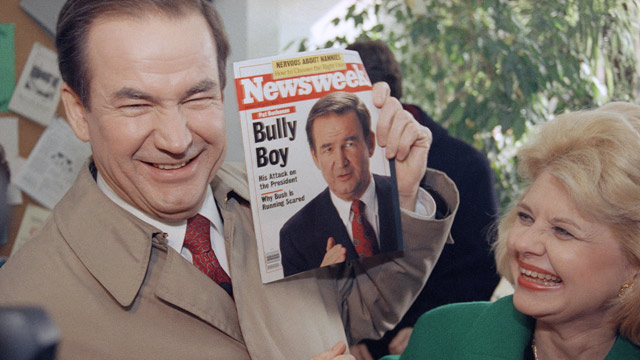
Rev. Jerry Falwell and Phillis Schlafly sing patriotic songs during a “Stop the ERA” rally in 1980. (AP Photo)
Much has been made in the past few weeks about the Republican Party platform being the most conservative platform ever.
Longtime culture war commander Phyllis Schlafly wrote an effusive op ed piece in The Washington Times on Monday, saying this year’s platform “may be the best one ever adopted.” As one Kansas delegate told New York Times reporter Adam Nagourney: “We are a very conservative party, and the platform reflects that.”
“…There is such a consensus within the party on opposition to abortion rights and same-sex marriage and on the importance of faith in public life, she suggested, that raising them this year has created neither surprise nor backlash.”
Nagourney recalls how presidential candidate Patrick Buchanan “rocked the [1992] Republican convention in Houston by declaring there was a ‘cultural war’ taking place for the soul of America, denouncing the Democratic Party as one that supported abortion, radical feminism and the ‘homosexual rights movement.'” And although many of Buchanan’s ideas are now considered mainstream within the party — and included in this year’s party platform — Nagourney notes that they are “not front and center in Tampa, at least not in the televised portion of the convention.”

Republican presidential hopeful Patrick Buchanan, accompanied by his wife Shelley, smiles while holding up a 1992 Newsweek cover of himself. (AP Photo/Karl Leitz)
In next week’s issue of The New Yorker (available online), Philip Gourevitch writes that Republicans are talking about it off-camera, particularly in Romney campaign strategy sessions. “Today, solid majorities of Americans support gay rights, legal abortion, and women in combat. Yet the GOP platform opposes them; the culture war that Buchanan trumpeted is no longer an insurgent cause but a permanent condition of the Republican Party, and, increasingly, it is being fought within the Party. …”

Code Pink protesters yell as Republican vice presidential nominee, Rep. Paul Ryan addresses the Republican National Convention in Tampa, Fla., on Wednesday, Aug. 29, 2012. (AP Photo/Jae C. Hong)
After last week’s public embarrassment over Missouri Senate candidate Todd Akin’s ridiculed comments about “legitimate rape,” Romney and his advisors are understandably concerned about distancing themselves from the members of their party who make centrist voters uncomfortable. And that’s hard work because those members are no longer on the GOP fringe.
Even Paul Ryan, who works hard to project a common sense, by-the-numbers pragmatism, has a record that includes cosponsored bills with Rep. Akins. Michael Kinsley notes in today’s LA Times that “[a]s recently as last year, Ryan cosponsored a bill with Akin that would require a full body scan each time any doctor wishes to perform an abortion.”
Ryan said, ‘Where in the world does he get this stuff?’ He said he has ‘no memory’ of cosponsoring the bill. ‘I cosponsor a lot of bills, just to be polite. Everybody does. You can’t hold me to the contents of any particular piece of legislation, just because I cosponsored it.’
‘The point is, though, that it’s just him and has nothing to do with me just as I have nothing to do with Gov. Romney, and Gov. Romney has nothing to do with Rep. Akin. The Republican Party is a big tent, as you know. We believe in individual rights, although we also have room for people who don’t believe in individual rights — as is their right.’
All three men, in interviews, took care to distance themselves from the 2012 Republican platform. ‘Never even seen it,’ Romney said. ‘What’s it say?'”
In Gourevitch’s conclusion, he recalls that “[a]fter the 1992 Convention, the columnist Molly Ivins wrote that Pat Buchanan’s speech ‘probably sounded better in the original German.'” Indeed, many believe Buchanan’s primary challenge and culture war campaign were factors in George H.W. Bush’s loss to Bill Clinton.
It will be interesting to watch Romney’s speech tonight at the convention (rumored to be about his Mormonism), to see how he will manage to finesse familiarity with the Christian right on a personal level while remaining distant from their polarizing platform.

